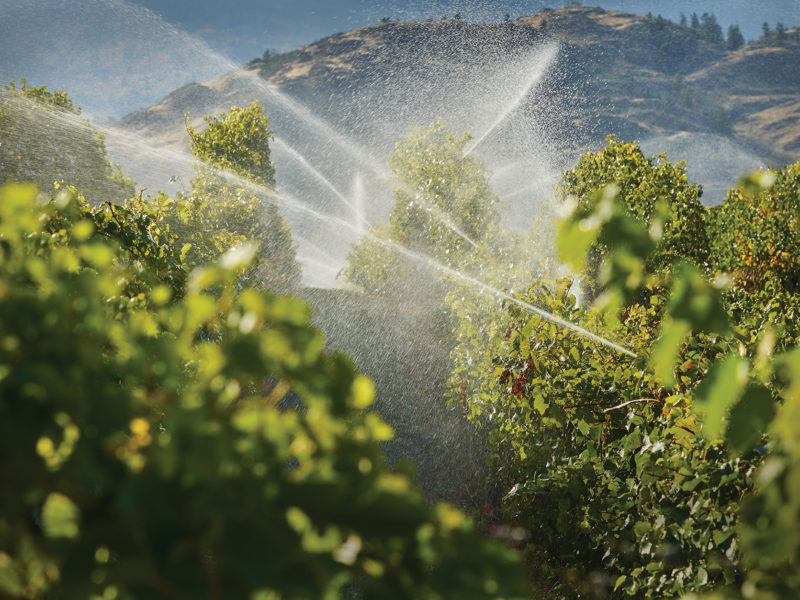VERNON – This summer’s dry weather resulted in a record number of restrictions on water use across southern BC, underscoring just how tapped out some basins are.
Salmon River remained at drought level 5 last month – the most severe under the province’s new six-tier drought rating system – even after the autumn rains arrived. The Upper Nicola was rated 4, only slightly better, with irreversible harm to aquatic life still possible.
With the province standing firm on a deadline of March 1, 2022 for existing non-domestic well owners to license their wells, a renewed push is taking place to make sure those wells are licensed. If they don’t, users in watersheds such as Bessette Creek in the North Okanagan, could find themselves out of luck.
“If you’re in an area like that, it’s going to be difficult to get a licence, because most of those streams are already fully recorded,” says Andrew Petersen, a water management specialist with the BC Ministry of Agriculture, Food and Fisheries who addressed the Abbotsford-based Centre for Organizational Governance in Agriculture on October 7. “You’d basically have to prove your groundwater well is not connected to the river to get your application through the door.”
The scenarios facing well owners in other areas of the province after March 1, 2022 are no less daunting. Users who have not applied for a licence will have effectively relinquished their historical rights, and the province will treat them as new users. This means their existing water rights will be reallocated to new applicants on a first come, first serve basis – the guiding principle of the first in time, first in right system BC has enjoyed since water rights were first regulated under the Gold Fields Act of 1858.
“You will lose your historic rights, you will lose your fee waiver, and depending on where you are, you may have a very difficult time getting that licence,” says Petersen, calling out the four watersheds where fish protection orders were issued this summer — the Bessette, West Kettle, Koksilah and Salmon. “They’re very drought-stricken. The chance of getting a new water use licence is going to be very, very low. So I’m really, really pushing hard to get producers to apply before deadline on that existing use.”
Yet the deadline doesn’t mean the taps will be turned off if users haven’t applied for a licence.
“It’s not going to be a mass send all the [compliance officers] out tomorrow to go find people. We’re told that’s not going to be happening,” says Petersen, noting that the BC Ministry of Forests, Lands, Natural Resource Operations and Rural Development has not hired more staff for enforcement.
This undermines the credibility of the new licensing regime, says Ted van der Gulik, president of the Partnership for Water Sustainability in BC.
During the recent provincial budget consultation, he urged government to allocate an extra $30 million per year for water management at FLNORD. This would include $11 million to hire staff to process licence applications, and $4.5 million for enforcement.
“The No. 1 thing is the province doesn’t have enough enforcement staff, and the province has not followed [up] on enforcement if you don’t have a licence,” he says. “If you’re not enforcing … guys that are flagrantly going against the act, and you’re not doing anything about it, why should I bother applying for a licence?”
While enforcement puts people out of business and is politically unpalatable, van der Gulik says sooner or later the province will have no choice.
One watershed he’s familiar with has seen new licence applications turned down based on the volume of current use, including one by a farmer who drilled a well expecting to be approved. The watershed currently has 270 registered wells, including more than 35 for irrigation. But just two have applied for licences.
“If I was that farmer, and I’ve got all this money invested in a well that I can’t use, I’m applying again on March 1, even though they turned me down on that previous application,” he says. “When I apply on March 1, the province cannot shut me down or turn my application away unless they shut down all the non-domestic users in that aquifer that have not applied, and so far it looks like there’s hundreds of them.”
While this situation may be extreme, it’s not uncommon.
According to Petersen, the province estimates that there are about 8,000 agricultural wells in the province. Of these, 2,700 have applied for groundwater licences. This works out to 34%, or more than triple the rate for all other sectors combined, which have filed just 1,300 licence applications. All told the province expects to licence 20,000 wells.
“Agriculture’s the shining star when it comes to the applications for existing groundwater. We really pushed hard, especially BC Cattlemen’s at the beginning,” says Petersen. “Agriculture’s done a very good job of trying to get out and get those applications in.”


 Producers silent on Columbia River Treaty impacts
Producers silent on Columbia River Treaty impacts